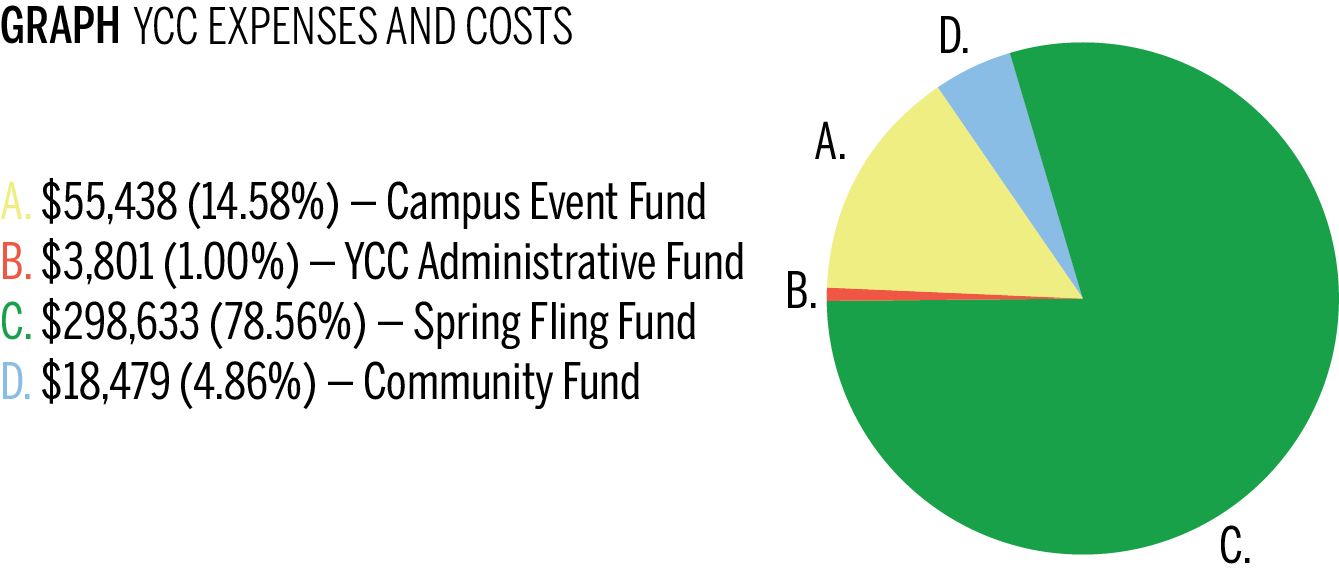
The Yale College Council finalized the details last month of its roughly $380,000 budget for this academic year.
This year, YCC revenue consists of last year’s $42,783 surplus, a $40,000 grant for Spring Fling and funding through the Student Activities Fee amounting to $297,375. In sum, the budget is approximately $20,000 larger than it was last year. Spring Fling alone takes up about 78 percent of the total budget.
But while Spring Fling is the single largest event hosted by the YCC annually, the council is looking to put the remaining portion of the budget toward more community-focused initiatives, including the Campus Events Fund and the Community Fund. While many budget lines stayed the same over last year, Spring Fling funding increased by roughly $21,000. Still, the percentage of the budget set aside for Spring Fling remained the same, said YCC Events Director Lauren Sapienza ’18. Sapienza added that because more students attended Spring Fling last year and may again this year, greater security measures are needed to keep up with the volume of attendance.
The Spring Fling fund pays not only for the artists’ booking fees, but also for the costs of Spring Fling security and set production. The exact amounts paid to each artist cannot be released due to privacy agreements, Sapienza said, adding that talent costs increase steadily regardless of whether the act’s popularity has increased. This rise in cost was covered in part by the 2015 increase in the Student Activities Fee from $75 to $125 per student.
YCC Finance Director Zach Murn ’17 said the YCC Events Committee kept its budget the same as last year, as they had spent precisely what they were allocated. Murn added that the YCC aimed to pass the budget as smoothly as possible.
“We wanted to pass the budget at our first [budget] meeting to make financial planning more straightforward and efficient,” Murn said.
However, not all proceeds from the expanded SAF went toward Spring Fling. YCC President Peter Huang ’18 noted that the Yale College Dean’s Office allocated other parts of the SAF to the Undergraduate Organizations Committee, which will reallocate the money to student groups in the form of administrative, event or publication grants. The total funds available from the SAF depend on the number of students who enroll at Yale each academic year.
Murn said that the Spring Fling Committee requested an increase in funding relative to last year. Murn also cited a “notable increase” in attendance relative to that of previous years — over 7,000 people attended Spring Fling last year. The YCC has also commissioned a student research team that will analyze and compare revenues and expenditures of student governments from other Ivy League schools in order to determine whether an additional increase in the SAF would be necessary in the near future, he said.
Already, the YCC is aware of a significant difference: Unlike similar events at other schools, Yale’s Spring Fling does not charge admission, which is a source of revenue for other student governments to cover costs.
“We feel strongly that Yale parties should be as open and as inclusive to everyone,” said Murn. “So we don’t generate revenues from ticket sales, which might create a dynamic of who can afford to go to Spring Fling and who can’t.”
While Spring Fling occupies much of YCC’s budget, the remaining 22 percent of the budget funds all the other YCC initiatives the council is seeking to bolster. Around $18,500 goes toward the Community Fund, which includes the Freshman, Sophomore and Junior Class Councils, the Yale Society Initiative — an organization of undergraduates and alumni that aims to reform senior societies — and the recently created New Ideas Fund. Each class council receives $3,500 to fund events such as Freshman Screw, Freshman Barbecue, Sophomore Crush and Box Night. The New Ideas Fund, which is $6,600, will ideally be distributed at a rate of $1,000 to $1,500 per approved student idea, said YCC Student Life Director Nicolas Zevallos ’19.
According to Sapienza, the over $55,000 Campus Events Fund will cover events throughout the semester, such as Hoedown, the Taste of New Haven Workshops and study breaks. The YCC’s budget approval process also involves a system of internal checks to ensure each year’s budget fairly distributes funding to all parts of the YCC.
“If the council isn’t happy with how the finance director divided up funds, representatives can request changes. For example, this year, the representatives petitioned for our New Ideas Fund, which was not on the original budget but which was subsequently added before it passed the council vote,” said YCC Vice President Christopher Bowman ’18.
All YCC bodies affected by budgetary decisions, including the class councils and various committees, are included in budget conversations to make sure funds are allocated with as much responsibility and fairness as possible, said Bowman.
Last year’s Spring Fling headliner was the singer Janelle Monáe.







